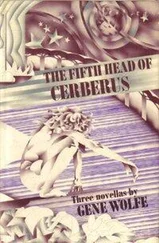Although I loved Mr. Million as much as I had when I was a boy, I was never able, after that conversation in which I learned the meaning of the familiar lettering on his side, quite to reestablish the old relationship. I was always conscious, as I am conscious now, that the personality I loved had perished years before I was born, and that I addressed an imitation of it, fundamentally mathematical in nature, responding as that personality might to the stimuli of human speech and action. I could never determine whether Mr. Million is really aware in that sense which would give him the right to say, as he always has, “I think” and “I feel.” When I asked him about it he could only explain that he did not know the answer himself, that having no standard of comparison, he could not be positive whether his own mental processes represented true consciousness or not; and I, of course, could not know whether this answer represented the deepest meditation of a soul somehow alive in the dancing abstractions of the simulation or whether it was merely triggered, a phonographic response, by my question.
Our theater, as I have said, continued through the summer and gave its last performance with the falling leaves drifting, like obscure, perfumed old letters from some discarded trunk, upon our stage. When the curtain calls were over we who had written and acted the plays of our season were too disheartened to do more than remove our costumes and cosmetics and drift ourselves, with the last of our departing audience, down the whip-poor-will-haunted paths to the city streets and home. I was prepared, as I remember, to take up my duties at my father’s door, but that night he had stationed his valet in the foyer to wait for me, and I was ushered directly into the library, where my father explained brusquely that he would have to devote the latter part of the evening to business and for that reason would speak to me (as he put it) early. He looked tired and ill, and it occurred to me, I think for the first time, that he would one day die—and that I would, on that day, become at once both rich and free.
What I said under the drugs that evening I do not, of course, recall, but I remember as vividly as I might if I had only this morning awakened from it the dream that followed. I was on a ship, a white ship like one of those the oxen pull, so slowly the sharp prows make no wake at all, through the green water of the canal beside the park. I was the only crewman, and indeed the only living man aboard. At the stern, grasping the huge wheel in such a flaccid way that it seemed to support and guide and steady him rather than he it, stood the corpse of a tall, thin man whose face, when the rolling of his head presented it to me, was the face that floated in Mr. Million’s screen. This face, as I have said, was very like my father’s, but I knew the dead man at the wheel was not he.
I was aboard the ship a long time. We seemed to be running free, with the wind a few points to port and strong. When I went aloft at night, masts and spars and rigging quivered and sang in the wind, and sail upon sail towered above me, and sail upon white sail spread below me, and more masts clothed in sails stood before me and behind me. When I worked on deck by day, spray wet my shirt and left tear-shaped spots on the planks which dried quickly in the bright sunlight.
I cannot remember ever having really been on such a ship, but perhaps, as a very small child, I was, for the sounds of it, the creaking of the masts in their sockets, the whistling of the wind in the thousand ropes, the crashing of the waves against the wooden hull, were all as distinct, and as real, as much themselves , as the sounds of laughter and breaking glass overhead had been when, as a child, I had tried to sleep, or the bugles from the citadel which sometimes, then, woke me in the morning.
I was about some work, I do not know just what, aboard this ship. I carried buckets of water with which I dashed clotted blood from the decks, and I pulled at ropes which seemed attached to nothing—or rather, firmly tied to immovable objects still higher in the rigging. I watched the surface of the sea from bow and rail, from the mastheads, and from atop a large cabin amidships, but when a star-crosser, its entry shields blinding bright with heat, plunged hissing into the sea far off I reported it to no one.
And all this time the dead man at the wheel was talking to me. His head hung limply, as though his neck were broken, and the jerkings of the wheel he held, as big waves struck the rudder, sent it from one shoulder to the other, or back to stare at the sky, or down. But he continued to speak, and the few words I caught suggested that he was lecturing upon an ethical theory whose postulates seemed even to him doubtful. I felt a dread of hearing this talk and tried to keep myself as much as possible toward the bow, but the wind at times carried the words to me with great clarity, and whenever I looked up from my work I found myself much nearer the stern, sometimes in fact almost touching the dead steersman, than I had supposed.
After I had been on this ship a long while, so that I was very tired and very lonely, one of the doors of the cabin opened and my aunt came out, floating quite upright about two feet above the tilted deck. Her skirt did not hang vertically as I had always seen it, but whipped in the wind like a streamer, so that she seemed on the point of blowing away. For some reason I said, “Don’t get close to that man at the wheel, Aunt. He might hurt you.”
She answered, as naturally as if we had met in the corridor outside my bedroom, “Nonsense. He’s far past doing anyone any good, Number Five, or any harm either. It’s my brother we have to worry about.”
“Where is he?”
“Down there.” She pointed at the deck as if to indicate that he was in the hold. “He’s trying to find out why the ship doesn’t move.”
I ran to the side and looked over, and what I saw was not water but the night sky. Stars—innumerable stars—were spread at an infinite distance below me, and as I looked at them I realized that the ship, as my aunt had said, did not make headway or even roll, but remained heeled over, motionless. I looked back at her and she told me, “It doesn’t move because he has fastened it in place until he finds out why it doesn’t move,” and at this point I found myself sliding down a rope into what I supposed was the hold of the ship. It smelled of animals. I had awakened, though at first I did not know it.
My feet touched the floor, and I saw that David and Phaedria were beside me. We were in a huge, loftlike room, and as I looked at Phaedria, who was very pretty but tense and biting her lips, a cock crowed.
David said, “Where do you think the money is?” He was carrying a tool kit.
And Phaedria, who I suppose had expected him to say something else, or in answer to her own thoughts, said, “We’ll have lots of time; Marydol is watching.” Marydol was one of the girls who appeared in our plays.
“If she doesn’t run away. Where do you think the money is?”
“Not up here. Downstairs behind the office.” She had been crouching, but she rose now and began to creep forward. She was all in black, from her ballet slippers to a black ribbon binding her black hair, with her white face and arms in striking contrast, and her carmine lips an error, a bit of color left by mistake. David and I followed her.
Crates were scattered, widely separated, on the floor, and as we passed them I saw that they held poultry, a single bird in each. It was not until we were nearly to the ladder which plunged down a hatch in the floor at the opposite corner of the room that I realized that these birds were gamecocks. Then a shaft of sun from one of the skylights struck a crate and the cock rose and stretched himself, showing fierce red eyes and plumage as gaudy as a macaw’s. “Come on,” Phaedria said, “the dogs are next,” and we followed her down the ladder. Pandemonium broke out on the floor below.
Читать дальше










